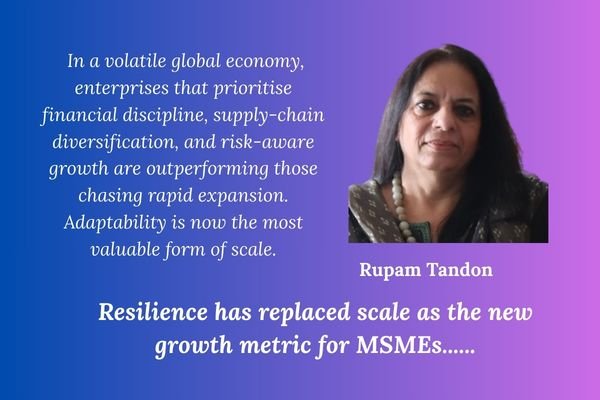Time to rebuild SME sector and strengthen them in terms of their real contribution to the economy.
SMEs will be key to reshaping, rebuilding and defining the post-Covid economy. The entrepreneurial spirit and innovative thinking that characterize them will go a long way in this context. The role of SMEs will be bigger in the post COVID scenario as they can diversify faster, identify more opportunities and innovate for a post-COVID economy.
While the pandemic caused an unprecedented health crisis, it also transformed lives in more ways than one. But whether this transformation is going to be short, medium or long term is not yet clear. How this plays out will determine the way businesses function in the days ahead, which will also define the role of SMEs in the post-Covid global economy.
While globalization has made economies more connected and accelerated trade, on the flip side, it facilitated consumers shifting to cheap products made in the world’s specialised manufacturing hubs which made small scale industries in the developing world lose out of the game. This has highlighted the need for transformation in terms of more power for small entities.
How COVID-19 has impacted SMEs worldwide
Millions of small businesses across the world turned non-functional and many gone bankrupt with the corona virus outbreak. A survey by International Trade Centre finds that “one out of four small businesses in developing countries will close permanently due to the crisis”.
An analysis conducted by McKinsey observes that between 1.2 to 2.1 million units may get affected in the US alone. The case is similar for almost all the regions, EU, Afro-Asian etc. This holds true for MENA- GCC region as well. A study by Dubai Chamber of Commerce observed significant negative impact of the pandemic on SMEs. Further, international monetary fund (IMF) forecasts that Global GDP growth would be -3 for the year 2020.

Diversification is the key: role of SMEs
As mentioned above the future holds for SMEs. However, entrepreneurs behind SMEs which are in trouble need to diversify and identify new opportunities.
SMEs have several strengths and advantages. They can diversify fast, adjust to the needs of the moment and arise to the challenges quickly. The entrepreneurial and innovative spirit that the SMEs have is what is needed to create new opportunities, identify potentials and to diversify into unexplored terrains.
Following are few important critical aspects in the context of emerging post-Covid scenario:
- Overdependence on global supply chains need not be a prudent idea. Supply chain disruptions these days call for attaining domestic self-sufficiency.
- Issues related to health and food security that emerges from excess dependence on global supply chains, due to the declining role of small industries.
- Impact on local jobs and rising unemployment can be checked only by strengthening small industries and engaging more people. Neglecting SMEs cause negative impact on local jobs.
- Ignoring SMEs can cause shortages during the time of any disruptive event, be it health emergency, accidents or natural calamities or even reasons caused by systemic factors or a political factor for instance trade blockades and trade wars.
Focus on building an SME dominated economy
The pandemic has proved the need for building an economy with significant role for SMEs, not just in terms of numbers and percentage share in total enterprise population. For that matter, most economies have 90 percent of their enterprises within the SME category. However, this alone is not an effective indicator in assessing the presence and role of SMEs in an economy.
The significance of the role of SMEs to the economy can be assessed in terms of the jobs that they create, their contribution to GDP, contribution to manufacturing output, high value exports etc.
Traditionally Small enterprises cater to the needs of local and domestic markets. With this crisis deepening SME units that fall under trade, commerce and services sector suffered the most causalities. For instance units that offer services in tourism, photography-videography, saloons-beauty parlours, food and hotel services, event management services etc. Needless to mention traditional retail trade and commerce establishments that are getting closed.
A careful observation of the demographics of SME segments that went out of the business, one could realize that it is the service and trade segment affected the most. Whereas pandemic has made the role of locally manufactured products from SMEs more in demand, mainly due to supply chain disruptions.
The following table shows the data for the MENA region. It shows a high dependence on imported goods.
| MENA Region: | 2014 | 2015 | 2016 | 2017 | 2018 | 2019 |
| Manufacturing, value added (annual % growth) | 3.6 | -0.5 | 4.2 | 2.4 | .. | .. |
| Manufacturing, value added (% of GDP) | 15.4 | 13.9 | 13.5 | 15.4 | .. | .. |
| Manufactures imports (% of merchandise imports) | 62.9 | .. | 67.1 | 65.1 | .. | .. |
| Manufactures exports (% of merchandise exports) | 24.3 | .. | 25.8 | .. | .. | .. |
| Exports of goods and services (% of GDP) | 28.4 | 24.6 | 23.5 | 28.1 | .. | .. |
| Employment in industry (% of total employment) (modeled ILO estimate) | 26.8 | 26.5 | 26.4 | 26.6 | 26.5 | 26.4 |
| Created from: World Development Indicators Country : Middle East & North Africa (IDA & IBRD countries) |
In this context following are some strategies that acquire priority:
- Diversification: While this period being a challenging time for SMEs, its also an opportunity for them to diversify with a different focus, as per the need of the market.
- Governments can reserve certain products and items for exclusive manufacture for the sector. Boosting domestic production and attaining self-sufficiency in such a select list of products can also contribute to economic diversification, for instance in the GCC.
To conclude: SMEs being nurseries of entrepreneurship, have excellent entrepreneurs who can make difference in this economic downturn period. The hope is indeed in SMEs. Entrepreneurs in SME sector are already in an action mode, even while the world was in lockdown, by diversifying, identifying business potentials and opportunities and by innovating.
However, it’s important for them that their products are still visible to the shoppers once normalcy is restored and not overshadowed and put below lower priced competitors. Indeed Covid-19 has proved the virtue of making goods at home country?
( This article was first published in AME INFO (ameinfo.com) on 8th July 2020: UAE <https://www.ameinfo.com/industry/finance/post-covid-economy-role-and-relevance-of-smes >
Author Profile
-
Dr. Perumal Koshy is Editor of Global SME News and Director of Strategic Initiatives at Enterprise Futures Lab. He writes on MSMEs, enterprise development, and policy issues affecting small business ecosystems.
Linkedin: https://www.linkedin.com/in/caushie/
Twitter: https://twitter.com/pkoshyin
Latest entries
 FEATURED25 November 2024Rethinking Work Hours: The Case for Balance in SME Growth Strategies?
FEATURED25 November 2024Rethinking Work Hours: The Case for Balance in SME Growth Strategies? AI25 November 2024Microsoft’s ‘Zero Day Quest’: A $4 Million Challenge to Revolutionize AI and Cloud Security!
AI25 November 2024Microsoft’s ‘Zero Day Quest’: A $4 Million Challenge to Revolutionize AI and Cloud Security! FEATURED5 November 2024Collaboration Agreement Signed Between Mubadala Energy and Perusahaan Listrik Negara (PLN) to Explore Harnessing Natural Gas Discoveries
FEATURED5 November 2024Collaboration Agreement Signed Between Mubadala Energy and Perusahaan Listrik Negara (PLN) to Explore Harnessing Natural Gas DiscoveriesFEATURED23 October 2024Resilient Trade Amid Global Uncertainty: How Intra-BRICS Commerce is Shaping a New Economic Order








